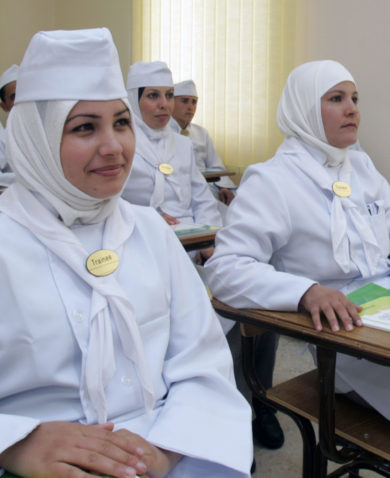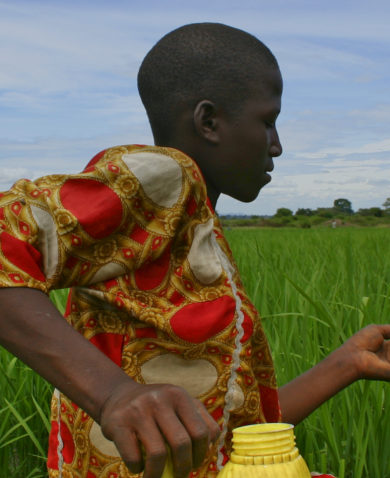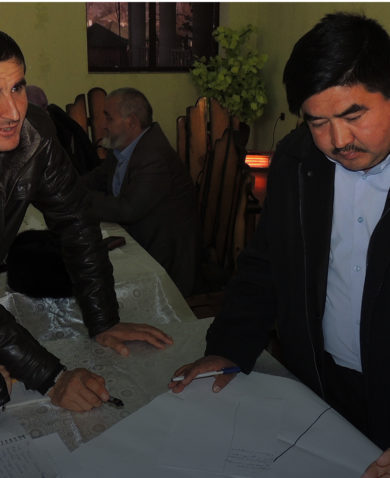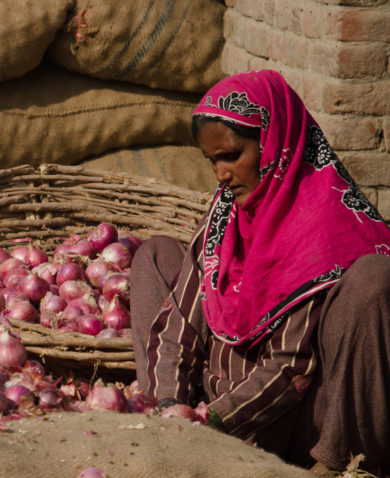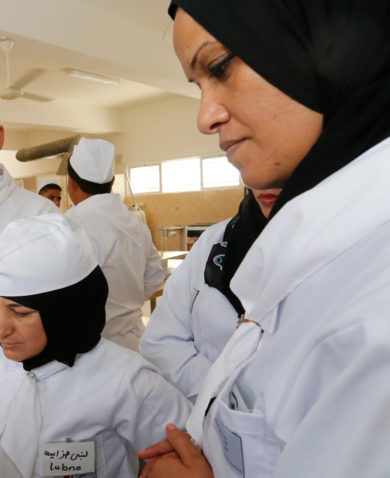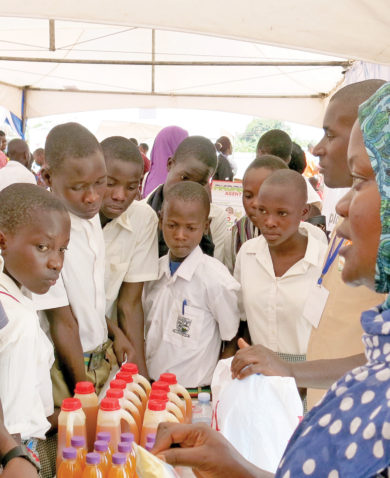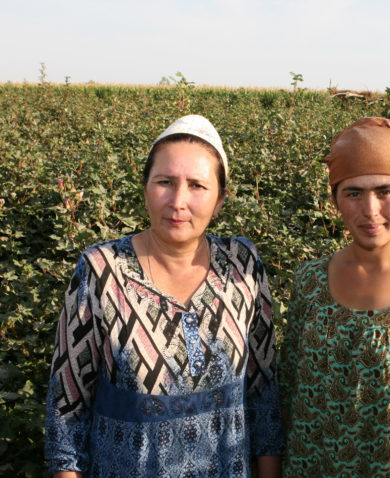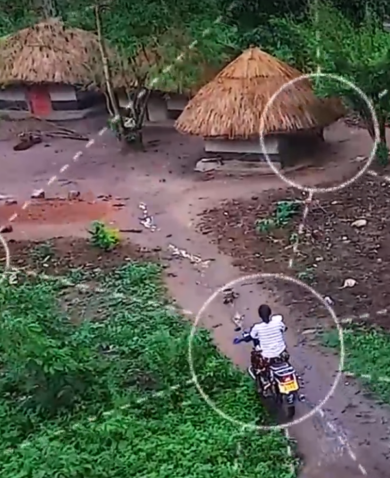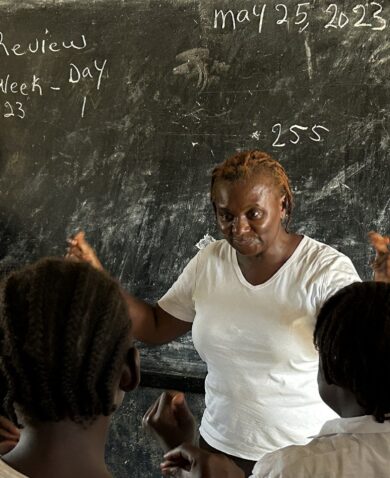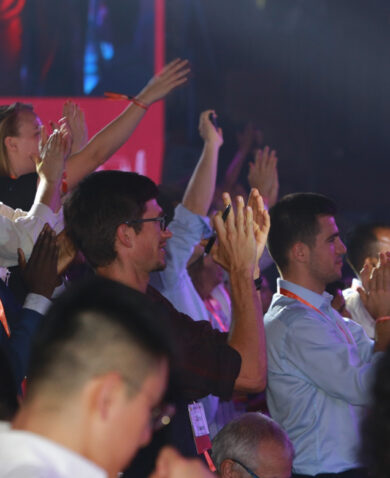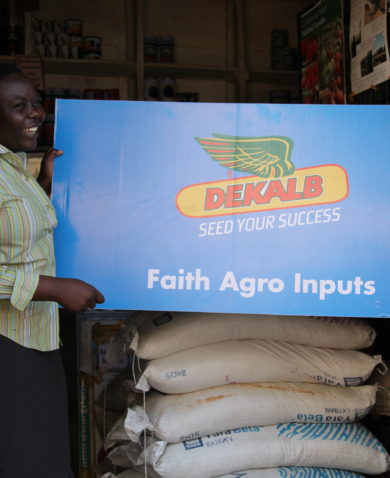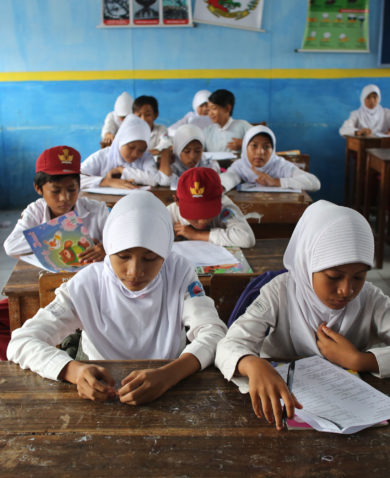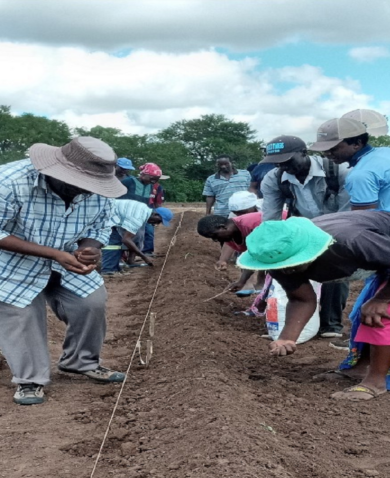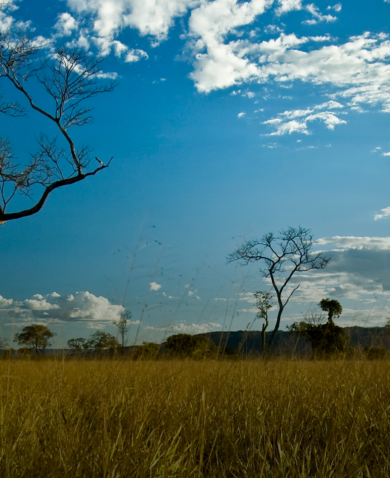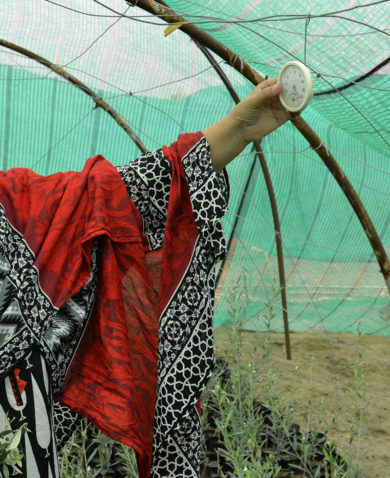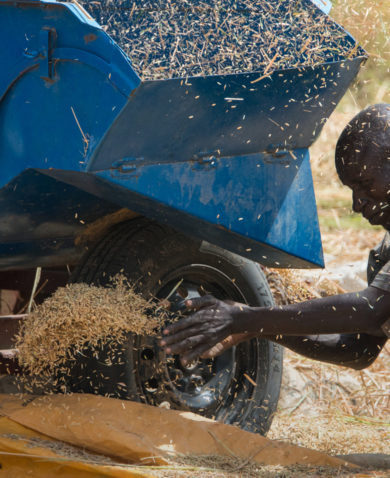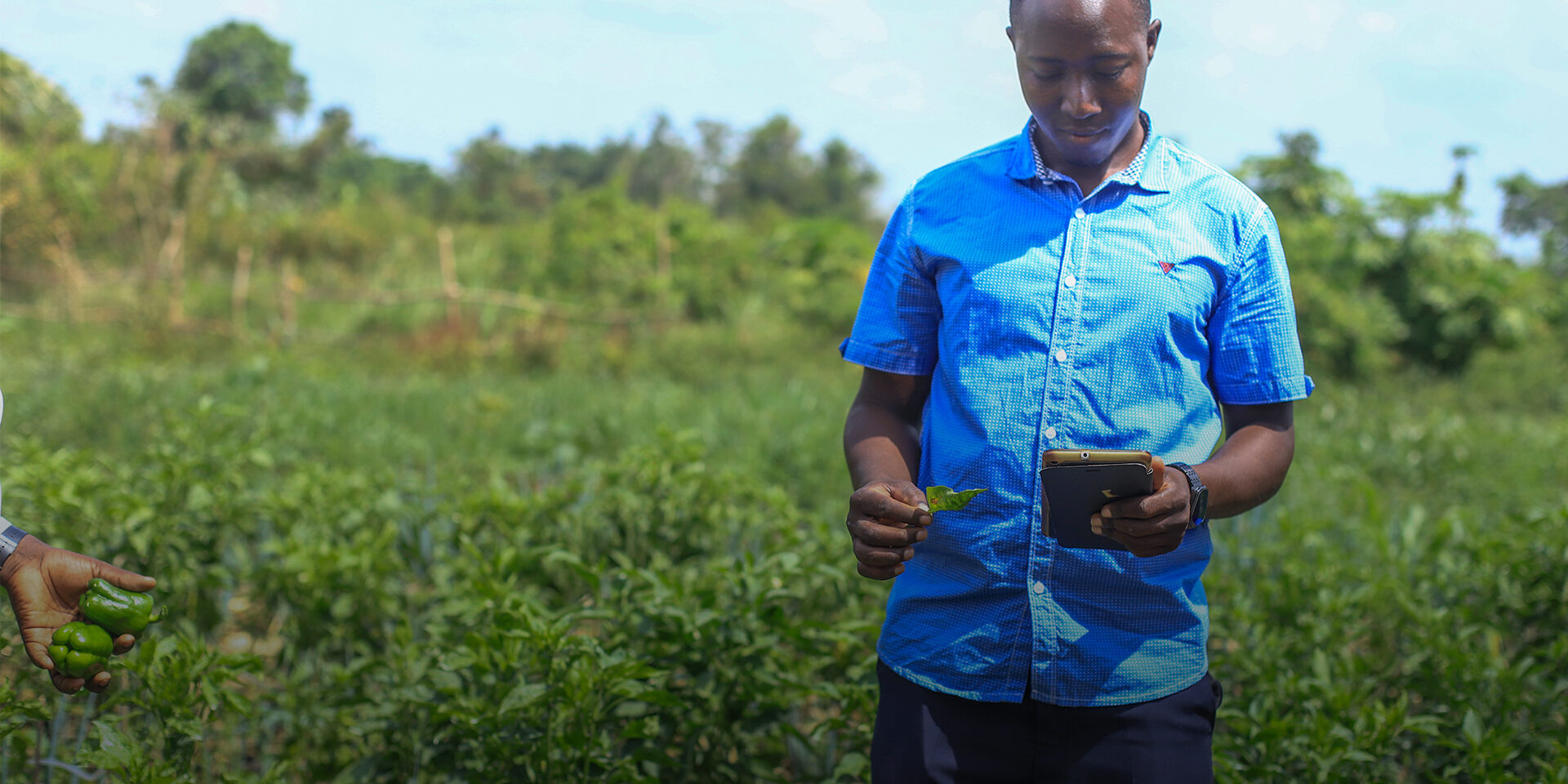
Growing the Next Crop of Agri-Tech Entrepreneurs Through Innovation and Scale .
May 19, 2022In Uganda, many farming families struggle financially. Three young Ugandan agri-tech entrepreneurs developed an innovative app and tapped talented young people to change that. A Chemonics project helped to bring their idea to scale.
Although agriculture has been a cornerstone of the Ugandan economy for generations, many farmers in the East African republic earned barely enough in 2013 to provide schooling for their children. Having grown up in smallholder farming families themselves, agri-tech entrepreneurs William Luyinda, Esther Karwera, and Zilla Mary Arach knew these struggles all too well.
“Unfortunately, at that time, our families and communities hadn’t profited greatly because of being uninformed about the smart ways of farming and unclear linkages to suppliers, service providers, and markets,” says Karwera. “This created unreasonable stagnation and led to serious economic challenges.”
Stories like this were common in the early 2000s and were causing many of the country’s youths to shun farming. This trend presented an additional threat to the nation’s already fragile economy: At that time, Uganda had the world’s youngest population, with more than 78% of its people below the age of 30, and one of the highest youth unemployment rates in Sub-Saharan Africa.
“We all came from farming families,” says Luyinda. “But many Ugandans believed farming was not an adequate occupation to earn a meaningful income, or they didn’t have the resources they needed to succeed. It was a serious problem because agriculture is critical for our economy, and the food it produces helps sustain us.”
To address concerns like these, USAID launched the Feed the Future Uganda Commodity Production and Marketing (CPM) Activity in 2013. Its goal was to enhance Ugandan agricultural value chains by incentivizing good practices during cultivation and market sales. Implemented by Chemonics, the activity sought to increase youth involvement in agriculture, climate-smart agriculture practices, market activities, and farm-production training.
With these goals in mind, CPM sponsored the “Youth and Agriculture: Exploiting Opportunities — Go for Gold” event in September 2014. The gathering was designed to create innovative ways to help young Ugandans discover financial opportunities in agriculture. It was there that fellow computer science students Luyinda, Karwera, and Arach successfully pitched the EzyAgric app to help farming families like their own. Their concept was to employ local administrators — called village youth agents or agri-input merchants — to use the mobile app to provide agronomy and weather information to less tech-savvy farmers. Using data that was input by the agri-input merchants or farmers themselves, the app also created farmer profiles for an information platform that traders, banks, and crop-insurance agencies used to consider loans and policies for specific farmers. The profiles were accessible to agricultural product and service suppliers looking for new markets. These digital services were in addition to the soil testing, spraying, planting, shelling, and purchasing services the agri-input merchants provided.
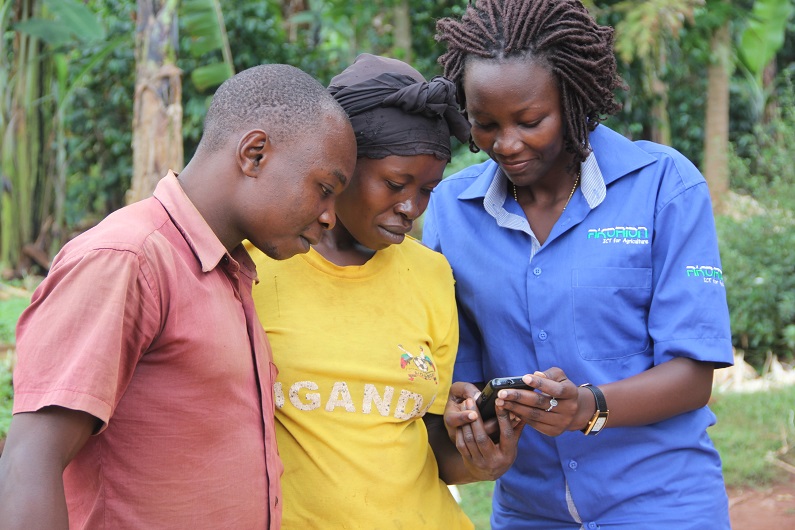
“It was a very innovative concept,” says Robert Anyang, who served as CPM’s chief of party. “We recognized immediately that it could be both a short-term success, and, if developed properly, it could one day be scaled to serve smallholder farmers throughout Africa and perhaps across the world.”
With this in mind, Anyang and the CPM team offered business-incubation mentorship for the innovative students. Luyinda, Karwera, and Arach expanded their partnership to include fellow student Jacob Kaatana; then, with guidance from the CPM team, they formed the limited liability company Akorion, which means “farmers” in Ateso (the language of the Teso subregion in Uganda). The company now does business under the name EzyAgric.
“Chemonics helped us put our idea to reality and develop a product best fit for the Ugandan and African Market,” explains Luyinda, who serves as CEO of EzyAgric. “They provided a testing environment, a sandbox for us to innovatively build, measure, learn, and iterate/pivot. We obtained tremendous mentorship and guidance from Mr. Anyang and his team in business development, financial support, and introduction to critical market players, who have since evolved into our business partners. We were able to move from ideation to the current product.”
Anyang explains that, to help develop organizations like EzyAgric, the team used the four tenets of the Chemonics innovation scaling methodology:
- Empower local actors to originate and drive development within their own communities
- Develop and validate sustainable commercial models that are supported by paying customers or governments
- Broker shared value to realize pathways to scale
- Explore a range of direct and blended options to reduce risk and secure investment focused on sustainability and scalability
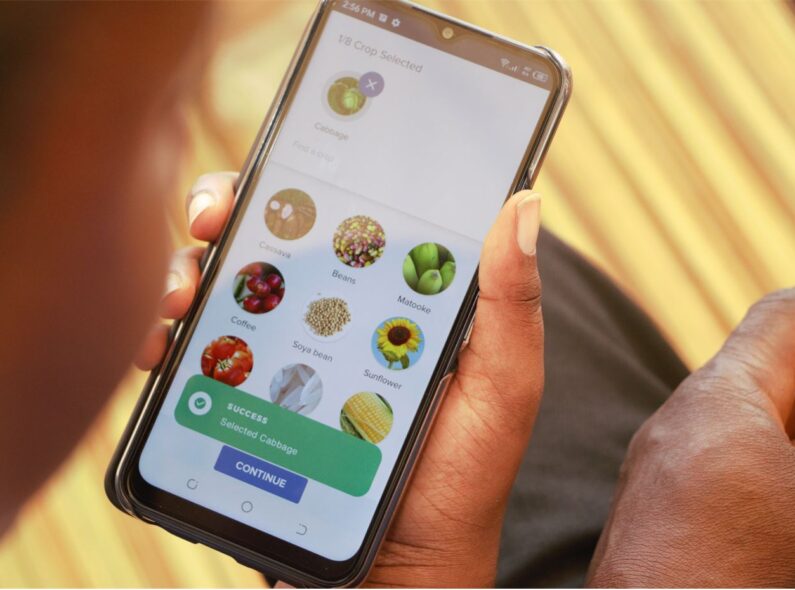
“Our goal was to help the EzyAgric team facilitate trusted local value-chain partnerships that created win-win opportunities so they would not be dependent on CPM for long-term business viability,” says Anyang. “With that in mind, we took a light-touch facilitative approach so that CPM did not become an active player in the value chain. This allowed for the gradual transition of CPM Activity-supported initiatives to private and public sector stakeholders when the business was ready.”
For EzyAgric, the transition from a CPM-supported activity to an expanding company with private-sector funding partners happened quickly. Shortly after its founding, it established commercial partnerships in the agricultural-supply and finance sectors. In 2019, K+S and leading pan-African fintech company MFS Africa announced a joint-venture partnership to invest in EzyAgric.
Funding from these commercial partners has helped grow the once fledgling startup into a successful entrepreneurial venture. Since its inception, EzyAgric and its commercial partners have provided agricultural services to more than 300,000 farmers and created more than 9,000 administrative and agri-input merchant jobs.
Bazanya Aloyzious is one of EzyAgric’s agri-input merchants based in Sekanyonyi, a settlement in Mityana District in Uganda’s Central Region. Since gaining merchant status two years ago, he reports that his personal income has increased by 50%, and he has developed pathways to expand his opportunities even further.
“I expect my revenue to increase even more when I become a master agent,” he says. “I’m also going to buy a motorcycle next year. With that, I will be able to visit more farmers in time and solve their problems.”
One smallholder farmer who had faced significant problems in the agricultural sector was Nasaka Mary Goreti, a mother of seven. She was struggling to get by on the income her farm produced, and then an EzyAgric agri-input merchant reached out to Goreti to share the app and its information. Goreti found that the app helped her better analyze her soil, acquire quality seeds, apply fertilizers and insecticides, and access better market pricing. Since she began working with the EzyAgric team, Goreti has increased her revenue from $100 to $800 per harvest. This made it possible for her to build a new house, pay off rented land, and expand her farm to include animal keeping. She credits the EzyAgric app for her success.
“It was a system all new to me,” she says, “but now it works very well, and now I can also keep some money aside in the bank.”
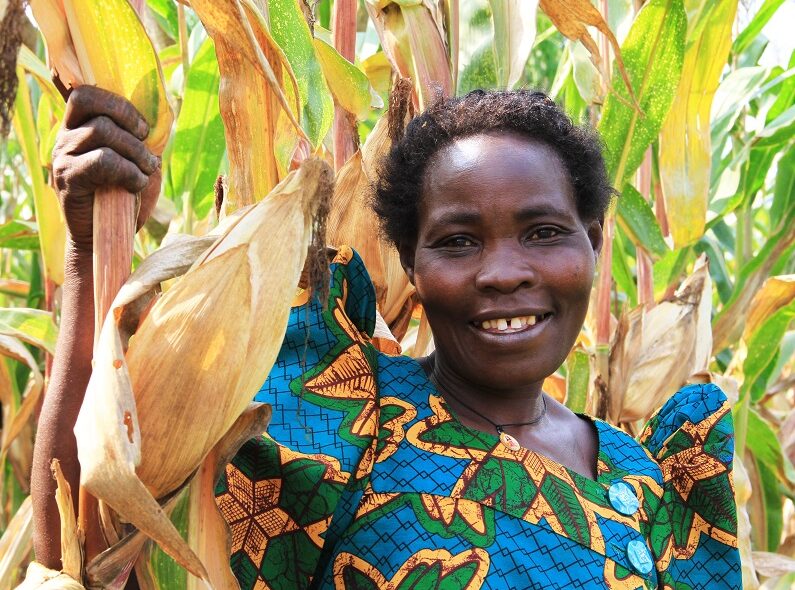
EzyAgric is looking to the next phase of scaling its initiative, with expansion beyond Uganda into more of Sub-Saharan Africa and other emerging markets. The team is moved by the support they have received and excited to have helped farming families like their own overcome agri-economic challenges and enjoy greater prosperity.
“It feels like an incredible accomplishment,” says Karwera, “especially when the impact is not only on one farmer. Seeing that farmer educate her children and seeing them graduate. Helping young businesses grow from being a local shop and regional agribusiness to providing jobs for other people. It’s not only the people we have directly worked with, but also the communities around them and beyond. We’re excited to continue to grow our company and help farming families like ours around the world.”
Banner image: Ugandan computer science students William Luyinda, Esther Karwera, and Zilla Mary Arach created the “EzyAgric” app to help farming families like their own. Their concept was to employ local administrators — called “village youth agents” or “agri-input merchants” — to use the mobile app to provide agronomy and weather information to less tech-savvy farmers.














